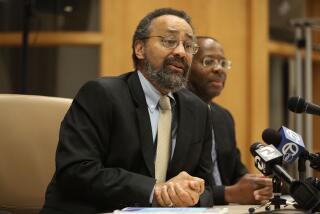Charles J. Ogletree Jr., law professor and civil rights scholar, dead at 70
Charles J. Ogletree Jr., a law professor and civil rights scholar with a distinguished career at Harvard Law School and whose clients included Anita Hill and Tupac Shakur, died Friday after a lengthy battle with Alzheimer’s disease. He was 70.
A California native who often spoke of his humble roots, Ogletree worked in the farm fields of the Central Valley before establishing himself as a legal scholar at one of the nation’s most prominent law schools, where he taught Barack and Michelle Obama.
Harvard Law School Dean John F. Manning shared news of Ogletree’s death in a message to the campus community Friday.
“Charles was a tireless advocate for civil rights, equality, human dignity, and social justice,” Manning said in the message that the law school emailed to the Associated Press. “He changed the world in so many ways, and he will be sorely missed in a world that very much needs him.”
Ogletree represented Hill when she accused Clarence Thomas of sexual harassment during the future U.S. Supreme Court justice’s Senate confirmation hearings in 1991.
He defended the late rapper Tupac Shakur in criminal and civil cases. He also fought unsuccessfully for reparations for members of the Tulsa, Okla., Black community who survived a 1921 white supremacist massacre.
Ogletree was surrounded by his family when he died peacefully at his home in Odenton, Md., his family said in a statement.
Ogletree went public with the news that he’d been diagnosed with Alzheimer’s in 2016. He retired from Harvard Law School in 2020. The Merced County courthouse in California’s agricultural heartland was named after him in February in recognition of his contributions to law, education and civil rights.
Ogletree didn’t attend the ceremony unveiling his name on the courthouse. His brother told the crowd gathered in the San Joaquin Valley town that his brother was his hero and that he would have expected him to say what he’d said many times before: “I stand on the shoulders of others.”
“He always wants to give credit to others and not accept credit himself, which he so richly deserves,” Richard Ogletree told the gathering.
Charles J. Ogletree Jr. grew up in poverty on the south side of the railroad tracks in Merced in an area of Black and brown families. His parents were seasonal farm laborers, and he picked peaches, almonds and cotton in the summer. He went to college at Stanford University before Harvard.
Manning said in his message Friday that Ogletree had a “monumental impact” on Harvard Law School.
“His extraordinary contributions stretch from his work as a practicing attorney advancing civil rights, criminal defense, and equal justice to the change he brought to Harvard Law School as an impactful institution builder to his generous work as teacher and mentor who showed our students how law can be an instrument for change,” he said.
Ogletree is survived by his wife, Pamela Barnes, to whom he was married for 47 years; his two children, Charles J. Ogletree III and Rashida Ogletree-George; and four grandchildren.
More to Read
Start your day right
Sign up for Essential California for the L.A. Times biggest news, features and recommendations in your inbox six days a week.
You may occasionally receive promotional content from the Los Angeles Times.






